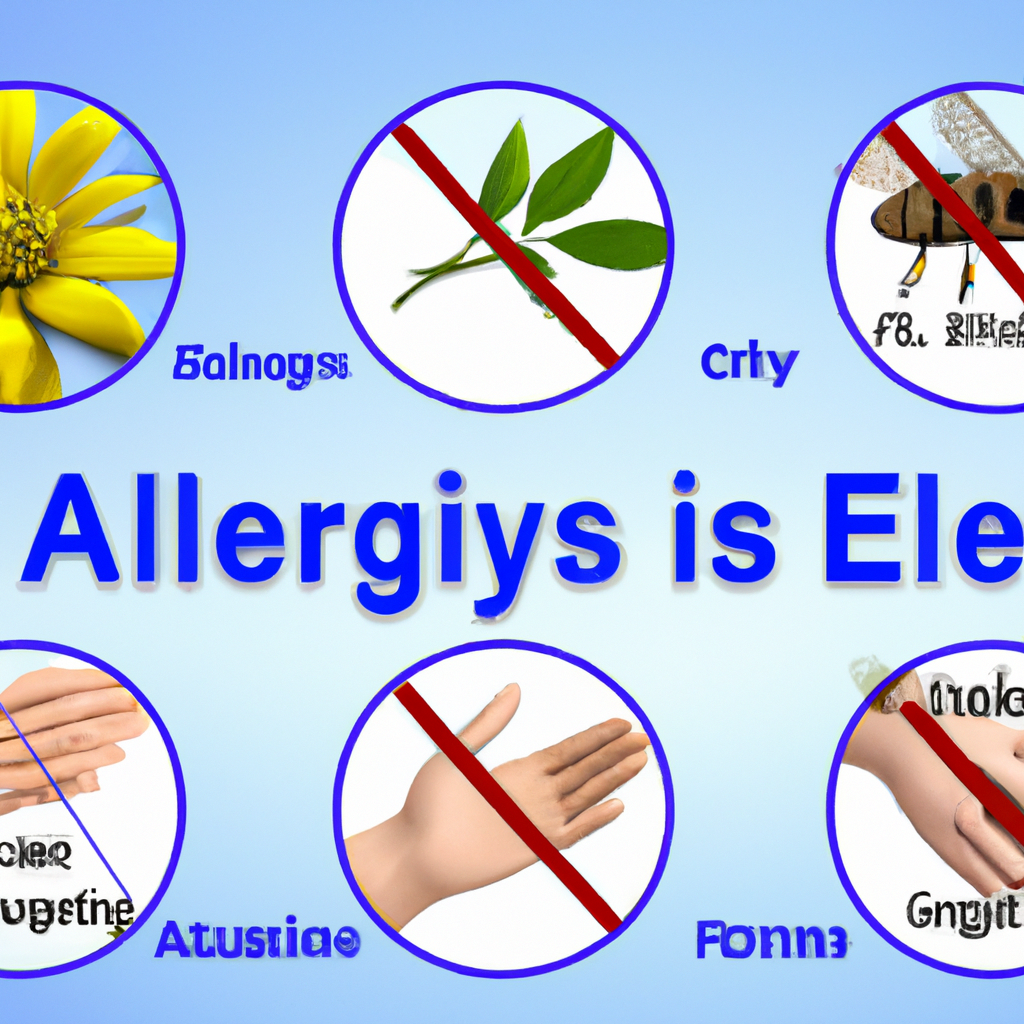From sudden sneezing to intermittent rashes, allergies can be extremely uncomfortable and disruptive. Allergies can create complications for day-to-day activities if not understood and managed correctly. In this article, we’ll explore the common signs, symptoms, and causes of allergies to provide valuable insight and knowledge on how to identify, manage, and prevent unwanted allergic reactions.
1. “Beyond the Itch: Unveiling the Mysterious World of Allergies”
Allergies: A Source of Misunderstanding
Allergies are a mysterious and complex disorder that affect people in a variety of ways. From itchy eyes to other more severe reactions, people have turned to a variety of treatments and solutions to reduce and even eliminate an allergic reaction. But what exactly are allergies?
An allergy is an overreaction of the immune system to an element in the environment that it perceives to be a threat. Common sources of allergies are food, dander, pollen, and dust mites. Symptoms can range from mild to severe, depending on the individual and the allergen they are exposed to. Common symptoms include:
- Itching, redness, or inflammation of the skin
- Runny or congested nose
- Wheezing or coughing
- Nausea or vomiting
- Hives or rash
While allergies may be annoying and at times even painful, it’s important to remember that not all allergies are bad. In fact, some allergies can even be beneficial in preventing illness or helping to improve the immune system.
When it comes to treating allergies, there are a few different options. Depending on the severity of the allergy, some individuals may opt to take regular antihistamines, while others might use preventative measures such as using air purifiers, or avoid certain substances that trigger reactions. Additionally, there are more invovled medical treatments to be aware of, such as immunotherapy, which is designed to gradually help the body to become less sensitive to allergens, as well as desensitization treatment that helps individuals build up a tolerance to specific allergens.
No matter the individual situation, allergies can be troublesome and inconvenient. But by understanding the ins and outs of allergies, learning about prevention and treatment strategies, it is possible to reduce or even eliminate the discomforts caused by allergies.
2. “When the Body Rebels: Unmasking the Hidden Culprits Behind Allergic Reactions”
Allergic reactions not only incapacitate us, but also perplex us. What is the hidden culprit behind the ill health? Is it something internal or external? Understanding the root cause lurking behind our reactions is important, since allergic reactions may stem from a varied range of sources. Unmasking the malefactor behind the mystery of allergies can help us circumvent their effects and lead healthier lives.
Ingesting Allergens
- One of the main culprits behind allergies are dietary components that may not be as beneficial as we thought. Common allergens are dairy products, wheat, gluten, peanuts, eggs, shellfish, and soy.
- Allergens may also be found in processed foods, such as food additives, preservatives, coloring agents, and flavor enhancers.
Environmental Components
- Physical air pollutants such as dusts, molds, pollen, animal dander, and smog also contribute to allergic reactions.
- Other external irritants can be environmental toxins, such as plastics, vinyl chloride, and chemical laden products like fragrances, paints, solvents, and propellants.
- Unfortunately, further allergens may be encountered in industrial work environments.
Internal Agents
- Internal allergens can include toxic substances secreted by some parasites, viruses, and bacteria.
- Sometimes, the body does not immediately reject the allergen; instead it may take hours or even days for a reaction to surface, which can make it difficult to identify the root cause.
Given the range of potential allergens, it may be a burdensome task to pinpoint the trigger. Knowing the allergens that trigger an allergic reaction is half the battle; the other half is to figure out how to cut back on the eyesores. Minimizing physical and dietary allergens can make a world of difference in our well being.
3. “Allergy Explorers: Navigating the Unpredictable Terrain of Hypersensitivity”
Allergies can be a frustratingly unpredictable medical issue that can leave people feeling powerless when trying to manage it. Seemingly harmless foods and exposures can lead to a wide range of symptom responses. There is hope, however, for the allergy explorer. Ninety percent of all allergies can be managed with education about the particular allergy and by placing a focus on an anti-inflammatory lifestyle.
- Carrying an EpiPen or other form of injectable medications can be life saving and should be utilized when advised by an allergist and/or primary care physician.
- Research local allergy care providers and consider seeing an allergist yearly for check-ups and to ensure that you are up-to-date on the newest treatments available.
- Change your diet to incorporate whole foods that are known to combat inflammation and reduce allergic reactions
When considering new foods, it is important to look at potential cross-contamination. Many food products are often made with shared equipment and may come in contact with common allergens. Always check the ingredient labels carefully and when in doubt, it’s best to avoid the uncertainty altogether.
Managing stress can be a powerful tool was well. Medical studies are beginning to demonstrate the strong connection that exists between feelings of stress and the onset of allergy symptoms. Consider adding activities like yoga and mindfulness to your daily routine to help to lower stress levels and foster greater physical health that will aid in reducing the intensity of allergic reactions.
Finally, when dealing with life’s unexpected allergies runs, reach out to your trusted support system. The unpredictability of allergies can lead to feelings of isolation and inability to cope with the daily production caused by allergies. A support system of family, friends, or neurological networks can help to ease the emotional burden and prevent further health complications caused by feelings of stress due to allergies.
4. “Unraveling the Allergic Puzzle: How Understanding Common Allergies Can Transform Your Life
An allergy can be a frustrating and uncomfortable condition, especially when you don’t know what you are allergic to. Allergies can affect the quality of your life, as they interfere with activities like running, gardening or even eating in restaurants. Fortunately, understanding common allergies can help you manage them better and help you get back to full functioning.
- Pollen and Dust – Allergies to pollen and dust are some of the most common allergies affecting a large portion of the population. While these allergens are commonly airborne, they can be hard to spot. Learning to recognize common allergen symptoms – like sneezing, coughing, and itchy eyes – can help you identify when you’ve been exposed and follow the proper protocol for dealing with your allergies.
- Animal Allergies – Animal allergies affect a lot of people, and can cause incredibly uncomfortable reactions. It can be hard to tell if you have an animal allergy without testing for it. It’s important to be aware of symptoms like itchy eyes, coughing, and difficulty breathing so that you can avoid contact with animals if needed.
- Mold and Mildew – Mold and mildew allergies can be tricky to identify, as they are so hard to diagnose. However, if you have symptoms like sneezing, congestion, and itchy eyes, you might have a mildew allergy. Understanding the signs and recognizing common allergen sources like damp basements or leaky roofs can help you protect yourself from exposure.
- Food Allergies – Food allergies are incredibly common and can be intensely unpleasant. If you’re feeling symptoms like nausea, vomiting, hives or difficulty breathing, a food allergy may be the culprit. Learning about common food allergens and keeping track of what you eat can help identify potential sources of allergic reactions.
Knowing the common allergens and the signs associated with them can help you identify and manage your allergies better. Educating yourself on allergens and understanding how they interact with your body can help you conquer the allergic puzzle and lead a happy, healthy life.
The more you understand about allergies and allergic reactions, the better you’ll be able to help yourself and those around you. Learn more about common allergies and stay informed to help ensure a healthy, allergy-free future!



